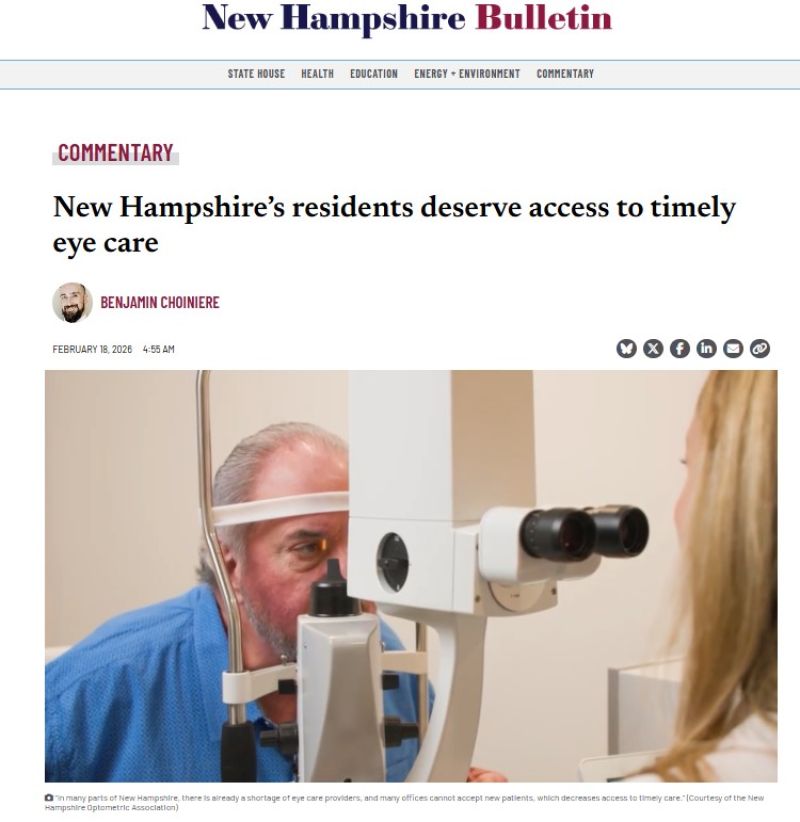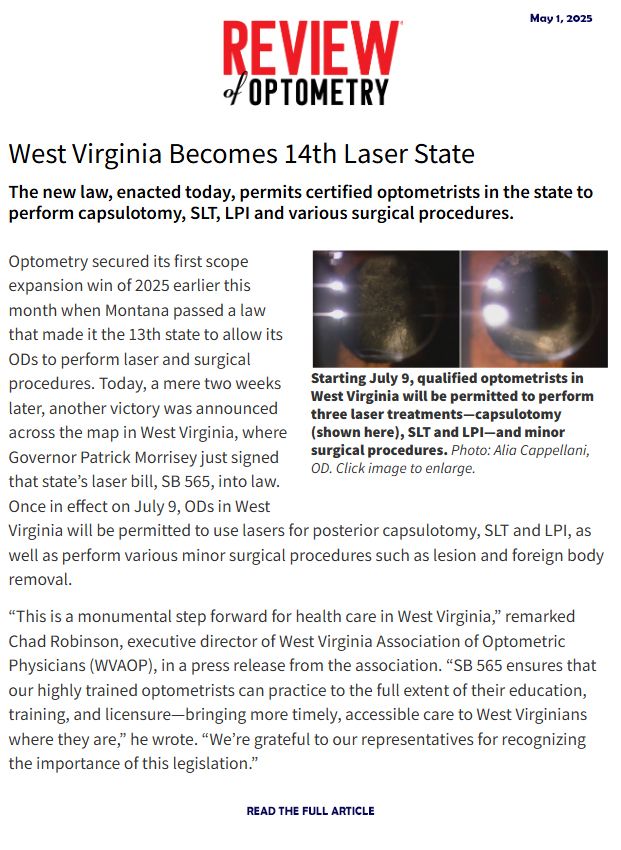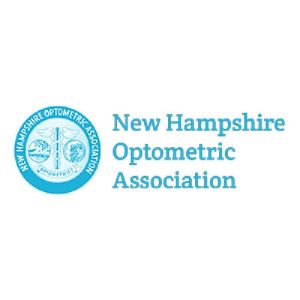BREAKING NEWS
In a decisive vote of 193–143, the New Hampshire House of Representatives approved HB 349 on Wednesday, January 7, 2026.
HB 349 passes Senate Committee, 5-0.
HB 349 passes Senate Committee, 5-0.
Now, doctors of optometry, also known as optometrists, are seeking to modernize New Hampshire’s outdated optometric scope of practice through legislation, HB 349, which will allow optometrists to improve access to care in our state. Read on for information about the legislation, why it’s needed, and what it will specifically allow.
Survey says...
- Americans prefer Doctors of Optometry as their eye care expert nearly 2x more than MDs (ophthalmologists).
- The most-trusted source for reliable eye health information is a Doctor of Optometry - not an MD (ophthalmologist or primary care physician).
(American Eye-Q Survey, Results published Jan 2019)

Optometry FORWARD - NHOA Laser Video Update - 14 states
An Accurate Demonstration of Laser Procedures Included in HB 349
NH Patients Deserve Better Access to Advanced Eye Care Without Lowering Quality Standards
The laser procedures included in HB 349 are in-office, non-invasive, safe and effective solutions performed by trained, certified and experienced Doctors of Optometry. Doctors of Optometry in 14 other states with expanded scope and within the U.S. Department of Veterans Affairs Community Care Program have successfully performed more than 140,000 of these procedures with no increase in malpractice rates or negative outcomes.
Educational Excellence
- Specialty training with a human body systems approach
- Standards are continuously improved and upgraded to match new treatments as they arise. Professional Optometric Degree Program accreditation standards took effect January 1, 2025, ensuring the continued educational rigor necessary for optometry’s expanding and essential role in health care.
- Solid national board certification system, uniform training, and a strong independent accreditation agency and state licensure systems.
4 years Undergraduate University
plus
4 years DOCTOR OF OPTOMETRY SCHOOL
of patients with eye diseases receiving care and individual treatment plans while the optometrist was in school
hours of optometry education and patient care before independently seeing patients
hours of ongoing education after graduation from Doctor of Optometry school
in laser treatment procedures, in‑office surgical care, and more
Proven Success
Doctors of Optometry have
performed in-office eye laser and eyelid procedures across the country since 1988.
140,000 procedures and counting...
with safe and effective outcomes
Zero unexpected complications
No increase in malpractice rates
*data from 2021-2022 public record of state boards
Optometrists are accessible across all of New Hampshire
Doctors of Optometry are trusted and more accessible than their eye surgeon colleagues (ophthalmologists).
You can find an Optometrist currently practicing in all 10 New Hampshire counties providing eye care access to 100% of the state’s population.
There are two New Hampshire counties without a single ophthalmologist, and two counties have only one.
By allowing optometrists to practice to their full level of training and education, NH residents will have improved access to the quality eye care they need, expect, and deserve.


Why do optometrists need states to legislate their profession?
MDs have always tried to limit the rights of optometrists, dentists, podiatrists, nurses, and other health care professions by maintaining restrictive state laws.
In fact, optometrists are the only remaining doctorate-level health care provider in NH that is required to change state laws in order to provide the full scope of eye care taught in optometry school.
A Professor of both Ophthalmology and Optometry's Perspective
Dr. Richard Castillo, OD, DO is both an Ophthalmologist and Optometrist. In this video he discusses the educational similarities and key difference of both professions.
Chapters:
Ophthalmologists commonly try to reduce patients' access to care by saying that only they can perform in-office eye procedures − even though Optometrists have been performing these procedures for decades.
Dating back to 1974, ophthalmologists have always attempted to undermine Optometric education and training to limit them from doing even basic procedures such as:
- Dilating pupils during an eye exam
- Recommending artificial tear drops for dry eye
- Prescribing eye drops for pink eye or glaucoma
- Treating eye lid chalazia (styes) with steroid injections
Imagine your Doctor of Optometry not being permitted to dilate pupils or treat pink eye as MDs have argued... for over the past 50 years!
HB 349 will authorize Doctors of Optometry to perform certain in-office, non-invasive, minor laser procedures to treat chronic glaucoma, treat and prevent acute emergency glaucoma, and remove a film that commonly develops after cataract surgery. It does not include procedures that require cutting into the eye, are completed in an operating room or require the use of general anesthesia. Legislation also authorizes the Board of Optometry to develop rules that must include live patient experience regarding certification of optometrists to perform these procedures.
Doctors of Optometry have been trained for and performed these in-office procedures in other states for decades.
In-office procedure certification requires:
- 4 years of Doctoral-level Optometry school;
- Evaluation and management of thousands of patients;
- Years of training in ocular disease and treatment;
- 3 national board examinations; and
- Performance proficiency examination.
Federal Government Recommends all Healthcare Providers Utilize Their Full Skill Set
In 2018, the U.S. Department of Health and Human Services released “Reforming America’s Healthcare System Through Choice and Competition," a report with recommendations for developing a better-functioning healthcare market that provides high-quality care at affordable prices for the American people.
“Recommendations: Broaden Scope of Practice - States should consider changes to their scope-of-practice statutes to allow all healthcare providers to practice to the top of their license, utilizing their full skill set.”
The New Hampshire Optometric Association proudly endorses HB 349's forward thinking legislation that aligns with the federal government's findings.
Students and doctors learn advanced procedures through accredited colleges of optometry but are not allowed to practice them in New Hampshire due to restrictive scope of practice laws.
Doctors of Optometry in other states have been performing in-office eye laser procedures for glaucoma and after-cataract care since the 1980s with safe and effective outcomes. A recent review of optometric laser procedures found “strong and compelling” evidence that expanding optometric scope of practice is safe for patients.
Doctors of Optometry in other states have been performing in-office eye laser procedures for glaucoma and after-cataract care since the 1980s with safe and effective outcomes. A recent review of optometric laser procedures found “strong and compelling” evidence that expanding optometric scope of practice is safe for patients.
Nationwide research comparing glaucoma in-office eye laser procedures shows...
13x more ophthalmologists (eye surgeons) make a patient repeat their laser procedure two additional times compared to when a Doctor of Optometry performs the same procedure.
Based on publicly available Medicare data
What ophthalmologists (eye surgeons) will say about HB 349:
Click each statement below to learn more
- MDs fight all scope of practice changes against Optometrists
- Ophthalmology will argue that these new bills open the door to hidden surgical procedures being performed by optometrists
- Eye MDs will argue that only MDs have the training to perform in-office eye laser procedures
- Ophthalmologists will argue there is no need to expand access to care
- Ophthalmologists will say that If an optometrist performs in-office laser procedures, the patient will require more re-treatments
- Eye MDs will argue that optometrists only take a weekend course to get certified for in-office laser procedures
MDs in New Hampshire have fought against the ability of Doctors of Optometry to care for their patients since the 1970s. In that time, MDs have tried to stop Optometrists from:
- Dilating patient’s pupils.
- Prescribing eye drops for pink eye and glaucoma.
- Prescribing oral medication for eye infections and inflammation.
- Performing in-office procedures to treat eye infections, inflammation and other conditions.
- Administering vaccines
MDs try to convince the public and legislators that only they should be allowed to perform these procedures despite zero evidence of ill-effects of optometric care over the past four decades. The entire Optometry profession has been built upon personal eye health and vision care for the betterment of society. This is why the public prefers Optometrists for their personalized eye health care.
HB 349 allows three common non-invasive, in-office laser procedures to treat chronic glaucoma, treat and prevent acute emergency glaucoma, and remove a film that commonly develops after cataract surgery. It does not include procedures that require cutting into the eye, are completed in an operating room or require the use of general anesthesia. Legislation also authorizes the Board of Optometry to develop rules that must include live patient experience regarding certification of optometrists to perform these procedures.
Optometrists are not allowed to perform any procedures that are not part of the accredited optometric curriculum.
In fact, HB 349 includes a long list of surgical exclusions to cement them into law.
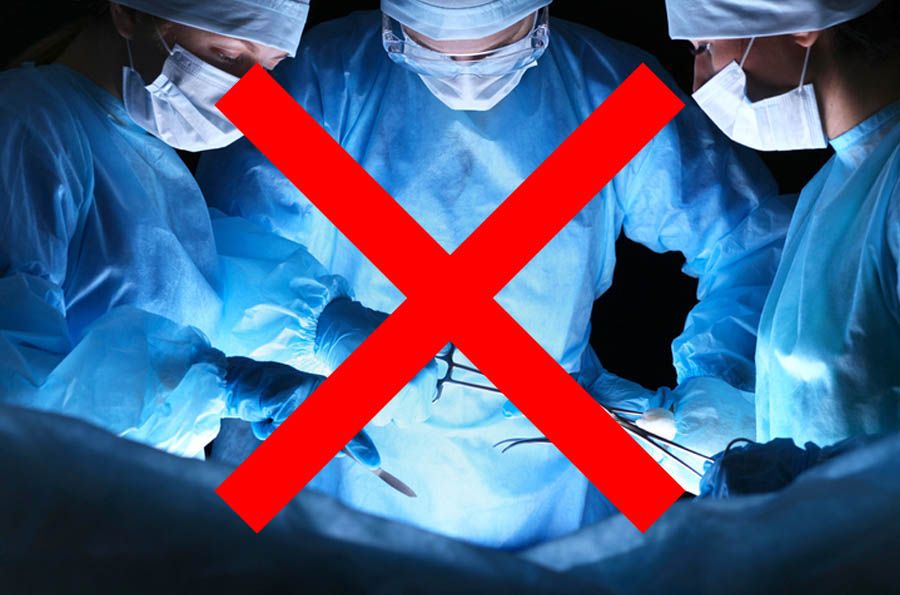
Doctors of Optometry have been performing in‑office procedures since the 1980s. The argument that only MDs are supposed to perform these procedures ended more than three decades ago.
Every Doctor of Optometry school across the nation trains optometrists for in‑office surgical and in-office eye laser procedures. In addition, every Optometrist that performs in‑office eye laser procedures has been certified by experts including ophthalmologists.
It's time to modernize the practice of Optometry in New Hampshire.

The number of ophthalmologists in the U.S. has remained stable since 1990, while the number of patients over age 65 will increase 42% by 2030 and 83% by 2050. This provider-to-patient imbalance will continue to worsen as 50% of ophthalmologists are older than 50 years old and closer to retirement than training. American Academy of Ophthalmology 2022
From 2020 to 2035, the total ophthalmology supply is projected to decrease by 12% and total demand is projected to increase by 24%, representing a supply and demand mismatch of 30% workforce inadequacy. In New Hampshire, which is tied with Vermont as the second oldest state by median age, the supply and demand mismatch is even more strained. ScienceDirect 2023

One optometrist in Oklahoma performed more laser procedures than a group of ophthalmologists. MDs exploited that by writing a paper about it. However, MDs refused to look at the nationwide data because it showed 13x more Eye MDs required patients to have 3 procedures compared to when Doctors of Optometry perform the same.

In-office eye laser procedure certification is a major endeavor. It requires:
- 4 years of Doctor of Optometry school
- Evaluation and management of thousands of patients
- Years of training in ocular disease and treatment
- Three board examinations
- Performance proficiency examination
It is the job of healthcare providers to remain current with medical advances and technologies.
No medical profession stands still.
All healthcare professionals learn new advances through continuing education (CE), including MDs, which builds on their formal foundational knowledge and skill.


10.1.2025 - HB 349 passes House Executive Departments & Administration Committee 12-3
1.7.2026 - NH House of Representatives full debate and vote moves HB 349 convincingly to the State Senate for consideration
Click here to read Dr. Choiniere's op-ed.

Letter to the Editor - January 7, 2026
Elizabeth Reese: Time to modernize optometry in N.H. and approve HB
To the editor:
I’m writing about “UNH poll: Granite Staters oppose bill to let optometrists perform eye surgery.” As a practicing optometrist in Conway and Berlin, I am sharing my reasons for supporting House Bill 349.
HB 349 allows optometrists to perform three in-office, minor, noninvasive laser procedures to treat chronic and acute emergency glaucoma and to remove a film that commonly develops after cataract surgery. These procedures are quick and painless. They are not completed in hospitals, do not require general anesthesia and do not involve cutting or injections into the eye.
Optometrists already manage glaucoma and post-cataract care, including postsurgery complications. This is especially true in our area, where patients travel hours to see specialists. We also already perform other minor, in-office surgical procedures, such as removing foreign bodies and surrounding damaged tissue.
Optometrists earn doctorate degrees after completing four years of optometry school, which includes rigorous classroom, laboratory and clinical training focused on the eye and its components. Every U.S. optometry school teaches the procedures outlined in HB 349, and qualified optometrists must meet strict certification criteria to perform them.
Currently, these procedures can be performed only by ophthalmologists in our state, despite being safely performed by optometrists in 14 other states since the 1990s. Optometrists practice in all 10 of New Hampshire’s counties. In two of those counties, optometrists are the only eye care providers. There simply are not enough ophthalmologists, and the number is expected to decline 24 percent in the next 10 years.
Approving HB 349 brings care closer to home, reduces costs and relieves pressure on overburdened specialists. It also provides choice for patients.
When optometrists began treating glaucoma, opponents predicted dangerous outcomes, yet New Hampshire’s optometrists have safely been providing this care for more than 25 years. It is time to modernize optometry in our state and approve HB 349.
Elizabeth Reese
Center Conway

New Hampshire’s legislators are considering bipartisan legislation to increase access to vision and medical eye care for all Granite Staters. Recent columns by Peter Schmidt, Bill Boyd and Mark Pearson have cited a proposed North Country partnership between a group of Seacoast ophthalmologists and Androscoggin Valley Hospital, as well as a recent University of New Hampshire survey, as reasons for opposing HB 349. As an optometrist practicing in North Conway and Berlin since 2013, this partnership is a welcome addition, but it does not negate the need for HB 349 nor solve many of the challenges associated with providing eye care services in our area or across the state.
New Hampshire’s legislators are considering bipartisan legislation to increase access to vision and medical eye care for all Granite Staters. Recent columns by Peter Schmidt, Bill Boyd and Mark Pearson have cited a proposed North Country partnership between a group of Seacoast ophthalmologists and Androscoggin Valley
Hospital, as well as a recent University of New Hampshire survey, as reasons for opposing HB 349. As an optometrist practicing in North Conway and Berlin since 2013, this partnership is a welcome addition, but it does not negate the need for HB 349 nor solve many of the challenges associated with providing eye care services in our area or across the state.
Over the last 13 years, I have watched many ophthalmologists commit to providing care in our area, only to end their partnerships as their practices in other, more populated parts of the state grew or travel became unsustainable. While many of these partnerships were successful for a short time, none have delivered a permanent solution.
Click here for the full op-ed as it appeared on January 7, 2026 in the Concord Monitor.
Angelique Sawyer, OD, FAAO, Diplomate ABO, is the owner Conway Eye Care in North Conway and Berlin. She is a past president of the New Hampshire Optometric Association and lives in Conway.

Letter to the Editor - January 7, 2026
HB 349 would have saved time and money
HB 349 would have saved reader time and money
To the Editor: In their Dec. 14th op-ed “New options for timelier rural eye care,” Reps. Jim Kofalt and Alicia Gregg discuss how HB 349 would benefit patients who are waiting months for appointments, repeating evaluations and paying extra co-pays for vision and medical eye care. Having undergone two of the procedures included in this legislation to treat glaucoma and post-cataract surgery care, I am one of those patients.
Although my eye doctor is trained to perform the procedures outlined in HB 349, I had to be treated by an ophthalmologist, which forced me to make three round trips, at four hours each, for glaucoma treatment. I also had to make one two-hour, out-of-state round trip for a post-cataract procedure.
In addition to wasting my time with unnecessary travel, I had to get multiple referrals and incur extra travel costs and office co-pays. I also had to wait five months from the time of the initial referral through follow up for the glaucoma procedure and one month for the post-cataract procedure. Both procedures were quick and painless, yet they both risked the loss of my eyesight because of unnecessary wait times.

HUFFER: Expanding Eye Care Essential as NH Population Ages
12/28/2025
As a practicing optometrist, I became a business owner for many reasons. One of those reasons was the desire to provide exceptional care to my patients by utilizing the latest training and technology. While my team and I are qualified to provide this care, we’re waiting for New Hampshire’s legislators to authorize us to do so.
In New Hampshire, like all states, optometry is a regulated profession. That means state lawmakers determine the scope of practice for health care providers, regardless of our training and education. That’s why I’m supporting HB 349, which will allow optometrists to perform three in-office, minor, non-invasive laser procedures to treat chronic and acute emergency glaucoma and remove a film that commonly develops after cataract surgery. Currently, these procedures can be performed only by ophthalmologists in our state. Yet, optometrists in other states and within the U.S. Department of Veterans Affairs’ Community Care Program have safely performed more than 140,000 of them since 1988.
One of those procedures, selective laser trabeculoplasty (SLT), is used to treat glaucoma, which affects about 3 million Americans and is the second leading cause of blindness worldwide. People over age 60 are at higher risk for the condition, and as our population ages, the need for treatment will increase. In other developed countries, SLT is the first line of treatment for glaucoma, meaning it is recommended before eye drops. In the U.S., eye drops are prescribed for initial treatment. This is problematic because of non-compliance with daily medication use, increased prescription co-pays, and risk of side effects and allergic reactions, especially for individuals with inflammatory conditions.
When optometrists are able to perform SLT procedures, patients are able to safely and effectively receive treatment from their eye doctor’s office, often the same day. Opponents of this legislation claim there are enough ophthalmologists, particularly in southern New Hampshire, to provide this treatment. However, appointment wait times for SLT procedures still average 2-3 months. Additionally, expecting patients to make additional appointments, build relationships with new doctors, travel farther from home, and incur additional co-pays can be challenging, especially for older adults caring for aging spouses or unable to drive. If patients don’t follow through with treatment, they risk losing their vision or even blindness.
Optometrists complete a four-year, postgraduate, doctoral-level degree program, and many, including myself, complete residencies after graduation. Our training includes the diagnosis and management of complex eye diseases, including glaucoma and cataracts, through extensive classroom, laboratory, and clinical training at an accredited school of optometry. This clinical training includes the use of advanced treatment methods such as non-invasive lasers under the supervision of attending optometrists.
Optometrists already diagnose and manage follow up treatment for glaucoma and post-cataract care. By allowing optometrists to perform the procedures to treat these conditions, we could enhance continuity of care for our patients.
Like all health care professionals, if optometrists determine patients require more specialized treatment, we refer them to colleagues with expertise in those areas. This is true even if our license and certification permit us to provide the care. For example, New Hampshire’s optometrists have had prescriptive privileges for decades; however, many never prescribe medications, while others may only write a few prescriptions a week. Authorizing optometrists to perform the procedures outlined in HB 349 would have similar outcomes. Optometrists who don’t have the infrastructure or aren’t able to invest in the technology wouldn’t provide this care.
For many optometrists, the ability to practice to the full extent of their education and training is an important consideration when moving to or remaining in a state. New Hampshire already has challenges recruiting health care providers. To continue attracting and retaining the best and brightest, our legislators must approve this legislation.
HB 349 is about giving patients the choice to receive care when and where they need it. It’s about enhancing our state’s health care workforce and improving quality of life for patients by reducing costs and eliminating unnecessary travel and wait times. Optometrists are dedicated to providing positive outcomes for our patients. Our priority is, and always will be, patient safety. Passage of HB 349 won’t change that.
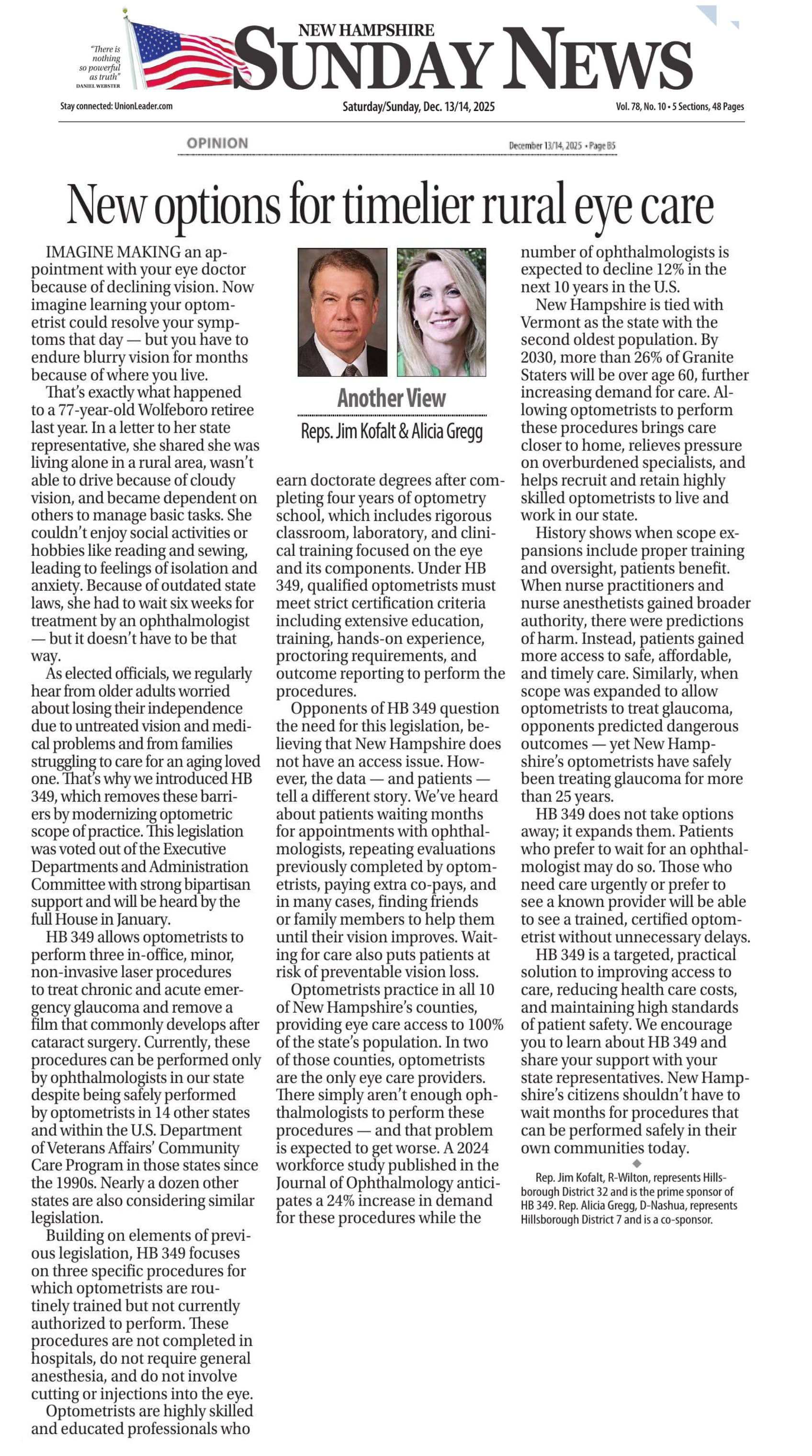
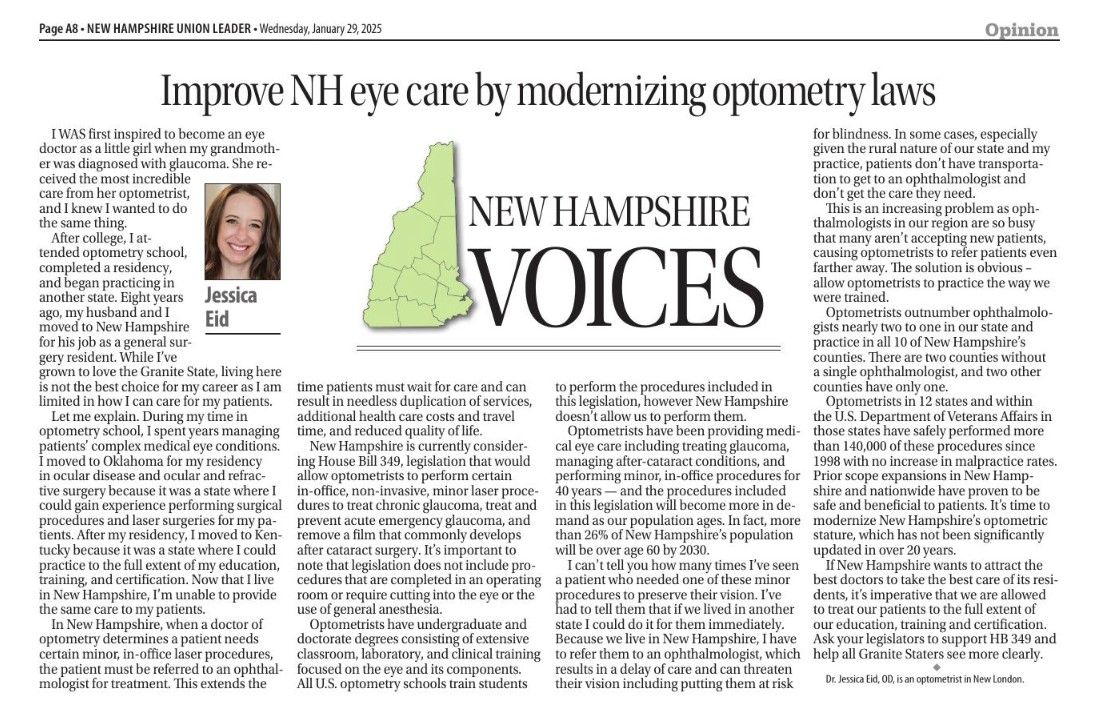
5.1.2025 - WV Becomes 14th Laser State
New Hampshire Optometrists have updated their scope of practice several times over the past 50 years to keep their patient care current with medical advancements. The experience of New Hampshire's Doctors of Optometry over many decades demonstrates the highest standards of care without any pullbacks, increases in malpractice rates, or disciplinary actions. New Hampshire optometrists have never let down the legislature or the citizens of the Granite State.
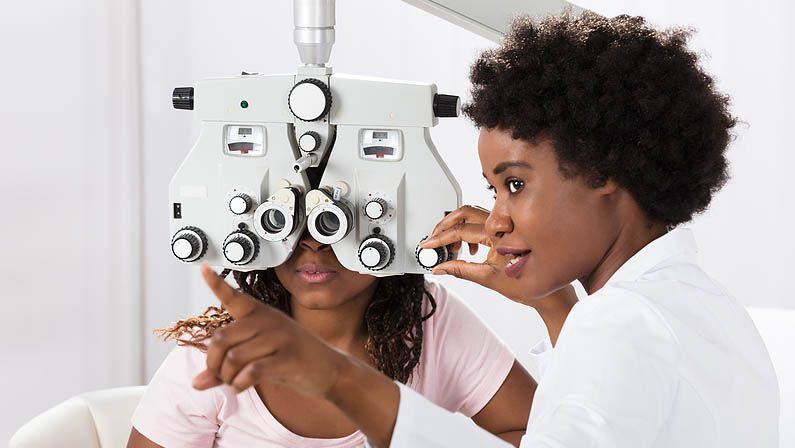
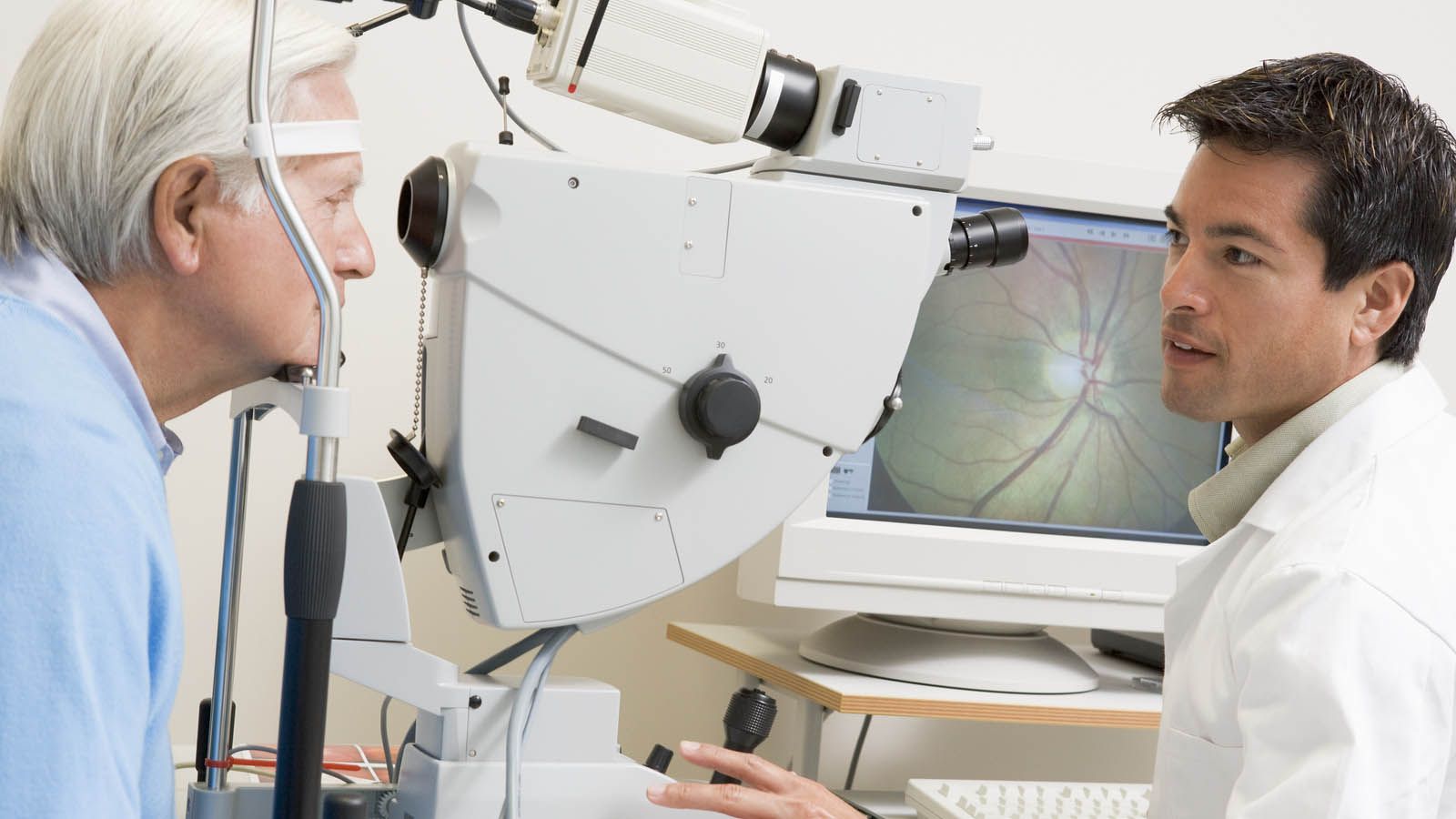
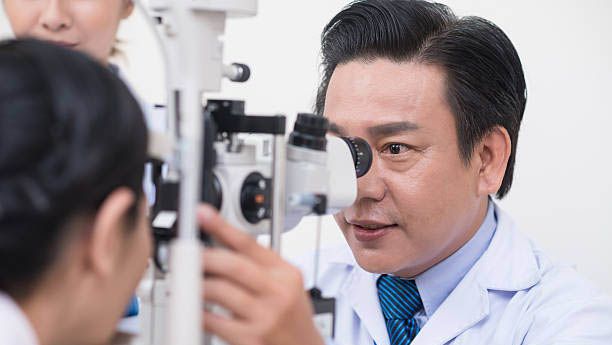
Optometry and Ophthalmology play a vital, coordinated role in modern eye care
Doctors of Optometry respect and work closely alongside Ophthalmologists to provide their patients the best possible eye care in New Hampshire.
Ophthalmologists provide a critical surgical role in LASIK, cataract surgery, incisional glaucoma surgery, retinal surgery, eye muscle surgery, corneal transplants, and much much more. Patients are much better served when each discipline is able to practice to the fullest extent of their education and training.

